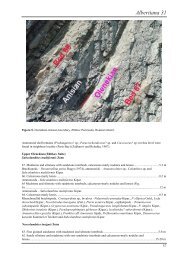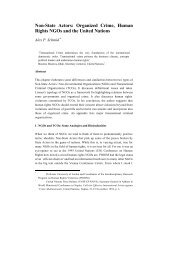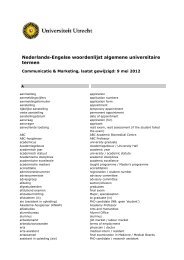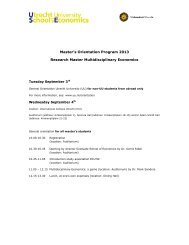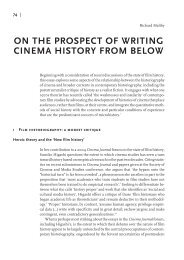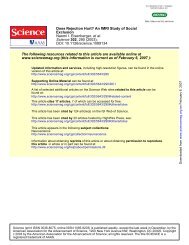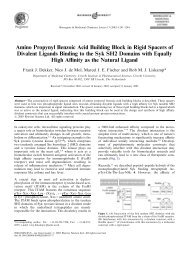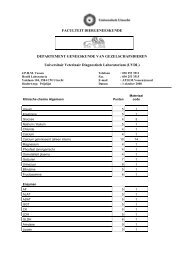Tour-de-Force
Tour-de-Force
Tour-de-Force
Create successful ePaper yourself
Turn your PDF publications into a flip-book with our unique Google optimized e-Paper software.
<strong>Tour</strong>-<strong>de</strong>-<strong>Force</strong>: Interplay between Mitochondria and Cell Cycle Progression Fall 2007important role in bringing the oxidized GSSG back into its reduced form the GSH (Boonstra and Post,2004).Table 1.2: Most important antioxidantsSource: Schra<strong>de</strong>r and Fahimi, 2004Influences of ROS on the cell cycleInterest in ROS as a possible regulator of the cell cycle has increased in the last <strong>de</strong>ca<strong>de</strong>, as the initial viewof ROS being merely an un<strong>de</strong>sired si<strong>de</strong> product of metabolic processes of the cell has lost its credibility(Menon and Goswami, 2007). Several studies have shown that ROS, besi<strong>de</strong>s from being toxic to the cellin high concentrations, can be useful in regulation of processes such as apoptosis and proliferation (Rheeet al., 1999). These two opposing effects of ROS might seem contradictory but can easily be explained bydifferent ROS types, levels, localization and exposure time. In<strong>de</strong>ed, several recent reviews suggest athreshold concept indicating that different ROS levels can have distinct effects on the cell (Menon andGoswami, 2007). Depending on its concentration and exposure time, ROS can have effects ranging fromenhanced proliferation to apoptosis (Boonstra and Post, 2004).It has been suggested that ROS can function as a secondary messenger in signal transductionand play a role in production of signaling molecules (Bae et al., 2000). Moreover, some reports suggestthat ROS can alter a protein, for instance PKC, by directly interacting with its cysteine residues whichcould result in change in activity (Klann et al., 2000).Cell cycle progression pathways influenced by ROSSince ROS can have diverse effects on the cell cycle, it is not surprising that many different processesinvolved in cell cycle regulation have been found to be influenced by ROS (Finkel et al., 2000). Productionof ligand-stimulated ROS activates proteins like mitogen-activated protein kinase (MAPK) (Brar et al.,1999), protein kinase C (PKC) (Junn et al., 2000) and epi<strong>de</strong>rmal growth factor (EGF) (Bae et al., 1997),which are all important proteins in control of cell proliferation. Conour and colleagues (2004) usedbioinformatics to i<strong>de</strong>ntify 92 proteins involved in cell cycle regulation that can possibly be regulated byROS. Ten percent of these proteins function in S phase and twenty percent function in G1 phase, whereashalf of the i<strong>de</strong>ntified proteins function in G2 and M.Transition from one phase of cell cycle to next is tightly controlled so that cell cycle progression proceedsonly when the cell is ready to continue (Boonstra and Post, 2004). These transitions and successfulprogression through the cell cycle are largely controlled by the activity of cdk-cyclin complexes (Morgan etal., 1997; Nigg et al., 2001). Regulation of cell cycle progression is largely <strong>de</strong>pen<strong>de</strong>nt on ubiquitination ofproteins of cdk-cyclin complex (Reed et al., 2003). ROS is reported to influence the ubiquitin pathway.Introduction of hydrogen peroxi<strong>de</strong> <strong>de</strong>creased the activities of ubiquitin-activating and -conjugatingenzymes (Jahngen-Hodge et al., 1997). It is possible that ROS play a role in regulation of the activity ofthe cdk-complexes by altering ubiquitin pathways.G1/S transition <strong>de</strong>pen<strong>de</strong>ncy on ROS levelsA recent study by Havens and colleagues (2006) suggested that ROS are required for progression fromG1 to S phase. When ROS levels were <strong>de</strong>creased by treatment of cells with antioxidants, cells can stillgrow but cell cycle progression is halted. The arrest is shown to be due to <strong>de</strong>creased cyclin A presence.Cyclin A accumulation in late G1 is essential for the activation of cdk2-cyclin A complex which is essentialfor progression into S phase, because the complex initiates DNA synthesis.Mitotic kinases and progression into M phaseSCI 332 Advanced Molecular Cell Biology Research Proposal 14




